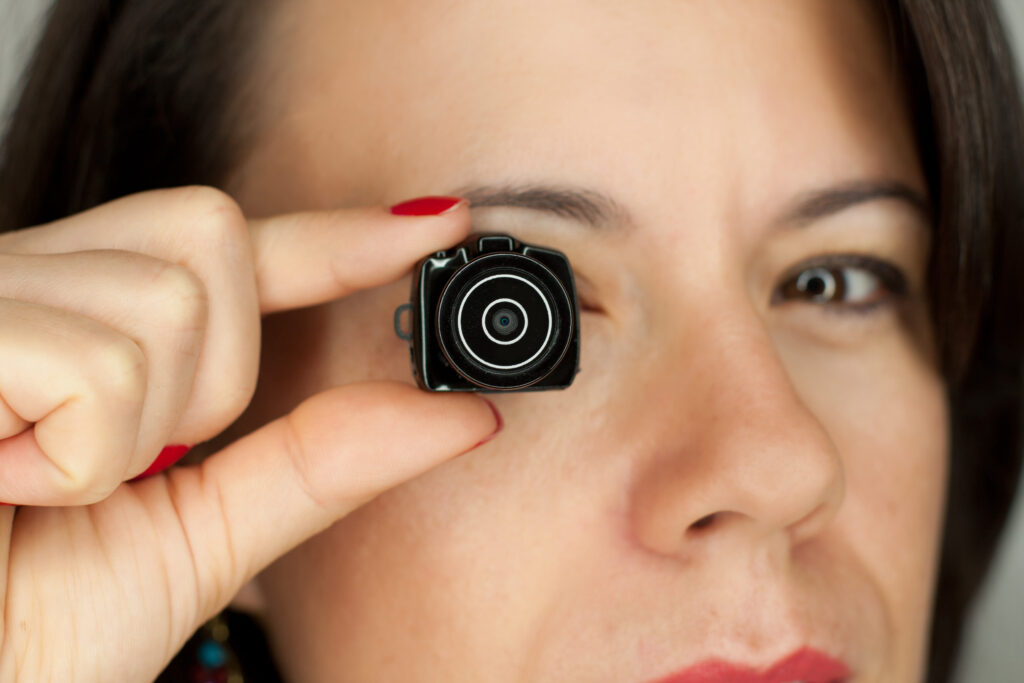Access to recording devices has become remarkably easy, and unfortunately, this accessibility has given rise to a concerning trend.
As an attorney, I have witnessed an increasing number of cases involving hidden recording devices during divorce proceedings.
As divorce becomes emotionally charged and trust erodes, some spouses take it upon themselves to secretly plant recording devices in their partner’s cars, hoping to uncover evidence of infidelity or gain the upper hand in the divorce.
As an attorney, I aim to shed light on this topic and provide insights and strategies to safeguard privacy, navigate challenging circumstances, and protect the rights of individuals amidst the complexities of divorce.

Is It Legal To Bug a Person’s Car With a Hidden Recording Device?
The short and simple answer to this question is “No,” it is not legal to secretly record a conversation. All 50 States have laws that protect people from having their privacy invaded.
States generally use two main approaches to determine when recording a conversation is illegal: “one-party consent” and “all-party consent.”
In “one-party consent states,” only one participant in a conversation must provide consent for legal recording. This means that as long as one person involved in the conversation consents to be recorded, it is legal, even without the knowledge or consent of the other parties.
On the other hand, “all-party consent states” require the consent of all parties involved in a conversation for the recording to be legal. In these states, it is illegal to record a conversation without the knowledge and consent of all participants.
When a recording device is secretly hidden and records a conversation, the recording will be illegal because no party to the conversation consented to the recording.
Tim’s Legal Tip: Whether you live in a “one-party consent” or “all-party consent” State, it is illegal to secretly record a conversation without consent. Secretly recording is a crime in all 50 States and can result in criminal charges.
Click here to find out the range of punishment for illegally recording a conversation in your State.

What Does a Listening Device Look Like?
These devices come in various forms and can be found on Amazon. I recommend going to Amazon and typing in “secret recording devices and cameras for cars.”
You will see the various forms of these listening and video devices. You can then look for similar devices in your car.
Common forms of these devices include the following:
- Pen Recorder: Description: A regular-looking pen with a hidden microphone and recording mechanism. It can function as a working pen to avoid suspicion.
- USB Flash Drive Recorder: Description: Resembles a standard USB flash drive with a concealed microphone and storage for recording audio.
- USB Charger Camera: Description: Resembles a standard USB adapter but has a concealed camera built-in.
- Magnetic Voice Activated Recorder: Description: This listening device is usually rectangularly shaped and about the size of a matchbook.
- Keychain Recorder: Description: Appears as an ordinary keychain or key fob, but it houses a microphone and a small storage unit for audio recordings.

Where Are Recording Devices Usually Hidden in a Car?
Knowing where to look is important to ensure your privacy and peace of mind. If you suspect your car may have been bugged with a hidden recording device, here are places you should check:
- In a Seat Pocket: The pockets on the back of your car seats are a frequent hiding spot for secret recording devices.
- In the Console of the Back Seat: This is a common hiding spot that is frequently overlooked when checking for bugs.
- Above the Pedals: Take a flashlight and inspect the area above the brake and gas pedals. The device could be stuck to the metal with a magnet or attached out of sight with adhesive tape.
- Between the Seats: This is another common location for hidden devices. Check carefully between the seats, as small devices can easily slip into these areas and remain hidden from view.
- Keychain Recorders: Check for any unfamiliar or new objects attached to your car keys or left casually in cup holders or storage compartments.
- USB Charger Recorders: Inspect any USB charging devices in your car. They may appear as standard chargers, but it may be worth investigating if you don’t recognize them or if they’ve appeared without explanation.
- Magnetic Voice Activated Recorders: Check under the seats and within the car’s body, as these devices are designed to stick to metallic surfaces.
- Pen Recorders: These can be clipped to sun visors or stored in the glove compartment or center console. If you see an unfamiliar pen in your car or one you didn’t place, it might be a disguised recording device.
- USB Flash Drive Recorders: Examine the USB slots in your car’s multimedia system. If an unrecognizable USB device is present, it could be a recording device.
If you discover an unfamiliar object, do not tamper with it. Instead, contact your local law enforcement agency, as they will have the necessary tools and knowledge to handle the situation appropriately.

What Are The Best Ways to Check a Car for a Hidden Listening Device?
If you suspect that your car has been bugged, here are some steps you can take to determine if that’s the case:
- Physical Inspection: Start by conducting a thorough physical inspection of your car. Look for any unfamiliar objects or devices. Remember to check hidden areas like under the seats, in the glove compartment, in the center console, in the sun visor, behind the rearview mirror, and in between seats. Examine any new or unfamiliar tech devices, like USB chargers, keychains, or flash drives you didn’t install.
- Inspect Wiring: Look for unusual wiring or wires that lead to nowhere, as these may be connected to a hidden device.
- Listen Carefully: Many electronic devices emit a low hum or buzzing sound. Listen carefully for unusual noises when your car is off and quiet.
- Use a Bug Detector: Invest in a reliable bug detector or RF signal detector. These devices can help you detect the presence of radio signals emitted by listening devices. Sweep the area methodically, focusing on potential hiding spots and places where you suspect devices might be concealed.
- Check Electronic Devices: Inspect your electronic devices, such as phones, computers, and smart TVs, for any suspicious applications or software that could be used for remote surveillance. Regularly update your software to ensure security patches are in place.
- Radio Frequency (RF) Detector: An RF detector can help identify wireless devices. These can be purchased inexpensively and can detect a range of frequencies common recording devices use.
- Smartphone Apps for Detecting Hidden Recorders: Some smartphone apps claim to detect hidden recorders and cameras. These apps typically utilize the smartphone’s built-in functionalities, such as the camera, infrared sensors, or radio frequency detectors, to scan for potential hidden devices. Some apps attempt to identify infrared light signatures or listen for unusual sound patterns, while others search for radio frequency signals that might indicate the presence of wireless transmitters.
- Use a Flashlight: In a dark environment, use a flashlight to look for the reflection of a camera lens. This could help identify hidden cameras.
- Check for Interference: If your radio is making strange sounds or your car’s electronics are behaving unusually, it might be due to interference from a recording device.
- Professional Help: If you’re still suspicious and can’t find anything, consider hiring a professional. They have special equipment and the necessary experience to find hidden devices.
It’s important to remember that if you find a device, you should not attempt to remove it yourself. Instead, contact law enforcement and let them handle the situation.
FAQs
Q. Are there laws against using hidden recording devices?
Yes, every State has laws prohibiting the unauthorized use of recording devices to invade someone’s privacy.
Q. What if I find hidden recording devices in my car?
If you find hidden recording devices, document their location and contact the authorities or legal professionals for guidance.
Q. Can a person go to jail for placing a recording device in a car?
Yes. All 50 States make it illegal to secretly record a conversation where a person has a reasonable expectation of privacy when you are not present and do not have their consent to record the conversation.
State laws punish these crimes anywhere from a misdemeanor to a felony.
Click here to find out the range of punishment for illegally recording a conversation in your State.

